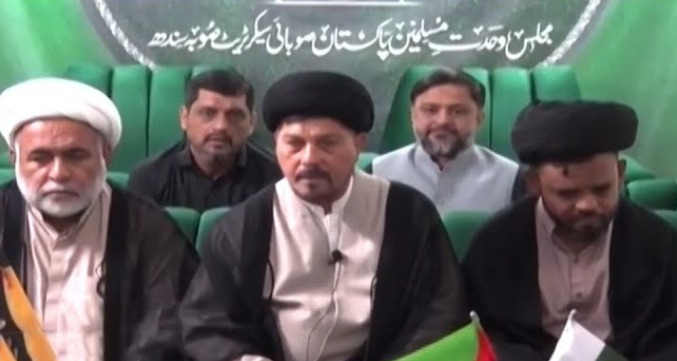Temporary truce reached as governor vows to press for visa extensions, flight increases
KARACHI — The Majlis Wahdat-e-Muslimeen (MWM) has hit the brakes — for now — on its planned protest march against the federal government’s ban on overland pilgrimages to Iraq for Arbaeen, after a late-night intervention by Sindh Governor Kamran Tessori.
The decision to suspend the demonstration came after Tessori visited the MWM headquarters in Karachi on Wednesday night. According to the governor, the pause is temporary, and more discussions are scheduled to continue on Thursday.
“We’re hopeful for a breakthrough,” Tessori told reporters outside the MWM office, adding that the matter would be revisited in the afternoon.
Why the Ban?
The controversy stems from a federal directive issued last month, barring Pakistani pilgrims from travelling to Iraq and Iran by road for this year’s Arbaeen pilgrimage. The ban was announced by Interior Minister Mohsin Naqvi, who cited serious security concerns following consultations with the Ministry of Foreign Affairs, the Balochistan government, and security agencies.
Naqvi reiterated his position from abroad via social media, stressing that the decision was taken solely to protect the lives of citizens amid heightened regional threats.
MWM Pushes Back
MWM, a prominent Shia political and religious group, quickly mobilized in opposition, calling the move unacceptable without the provision of a practical alternative. Speaking to the press, MWM Vice Chairman Allama Ahmed Iqbal Rizvi made it clear that the protest march had not been abandoned — just temporarily suspended.
“We’ve only paused, not called it off,” Rizvi said. “If there’s a security threat, the state should simultaneously offer an alternative route for the pilgrims. This isn’t just a political issue; it’s a religious obligation for hundreds of thousands.”
What’s Being Negotiated
In a bid to ease tensions, Governor Tessori told MWM leaders that he had spoken directly with Interior Minister Naqvi, currently in the U.S., and conveyed the community’s concerns. According to Tessori, several options are now under review:
- Extending the validity period of Iraqi visas for Pakistani pilgrims
- Increasing the number of chartered flights to Iraq
- Subsidizing airfares through federal channels
Additionally, Tessori assured Rizvi and other MWM representatives that he would involve Minister of State for Interior Talal Chaudhry in the next round of talks, which are expected to take place in Karachi.
A Mass Movement at Stake
The Arbaeen pilgrimage is one of the world’s largest religious gatherings. Each year, approximately 700,000 Pakistanis head to Karbala to mark the 40th day of mourning after the martyrdom of Hazrat Imam Hussain (RA) in the historic Battle of Karbala.
Traditionally, many pilgrims prefer overland travel due to lower costs and spiritual significance. The sudden suspension of this route has disrupted preparations for thousands who were already arranging logistics.
Rizvi emphasized that logistical constraints, no matter how serious, should not result in outright denial of access. “We understand the need for security,” he said, “but denying the path without offering an alternative is not an acceptable solution.”

